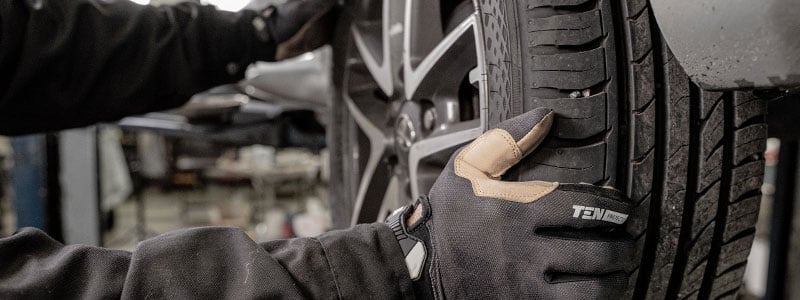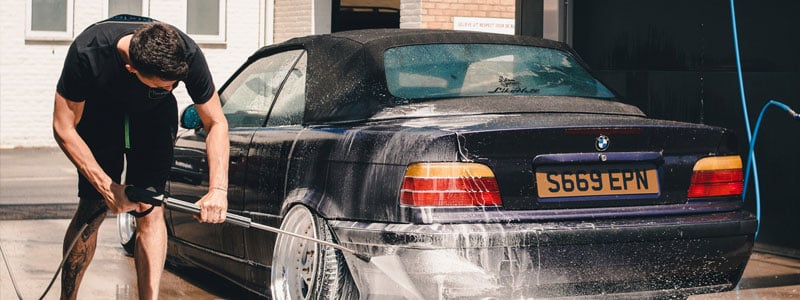Vehicle malfunctions can cause up to 45,000 car accidents per year. Most of these breakdowns occur due to poor maintenance on the owner’s part.
Postponing the vehicle’s maintenance for a long period can also affect the car’s performance over time. This is why you must regularly service your car to mitigate safety risks on a road trip and save yourself from experiencing major issues in the long run.
But what is a car service, really?
Car maintenance includes inspecting the vehicle to repair any damages and keep the car running smoothly. Regular servicing ensures that your vehicle receives the necessary attention to maintain its optimal performance.
Don’t know where to start? This comprehensive guide offers ten essential car maintenance tips to ensure your vehicle remains in optimal condition.
10 Top Car Maintenance Tips
Regular car care ensures that your vehicle’s performance is not compromised over time. By following the tips in this owner’s manual or checklist, you can charge your vehicle’s performance and leave any worries in the rearview mirror.
So, strap in, and embark on a maintenance adventure that will keep your wheels spinning smoothly and your ride at peak performance!
1. Check Your Tires
Give your tires the attention they deserve! Your trusty tires bear the weight of your car, handle bumpy roads like pros, provide reliable braking, and keep your grip on slippery surfaces. Therefore, it’s essential to check the air pressure and tire treads at least twice a month, especially if you’re embarking on long journeys.
- Tire pressure. Tires should be inflated to the correct pressure, which is usually listed on the sidewall of the tire. Underinflated or overinflated tires can cause accidents, so it is important to check the pressure regularly.
- Rotate Tires. Rotating your tires helps to evenly distribute wear and tear, which can extend the life of your tires. Most experts recommend rotating your tires every 5,000 to 7,500 miles.
- Tread depth. The tread depth is the measurement of the depth of the grooves in the tire. The tread depth is important because it helps to provide traction on the road. When the tread depth is low, the tires will not be able to provide as much traction, which can increase the risk of accidents. Most experts recommend replacing tires when the tread depth is 2/32 inches or less. You can easily do this with the penny trick.
Additionally, it is crucial not to disregard your spare tire. Spare tires can also experience wear and deflation over time. By following these tips, you can help to keep your tires in good condition and extend their life.

2. Change the Engine Oil
Engine oil plays a critical role in lubricating the engine’s components, safeguarding them against friction-induced damage. Driving a vehicle with low oil levels poses risks to the engine, reducing its longevity and fuel efficiency. Moreover, engine oil has a specific mileage limit, and exceeding it can lead to detrimental consequences. Neglecting an oil change can also result in the oil transforming into sludge, which can obstruct the engine’s narrow passageways.
You have two options for an oil change: follow the recommended mileage interval or consider the oil’s consistency and color. If the oil appears brown or black when checked with a dipstick, it’s time to bid farewell to the old oil and replenish it with fresh lubricant. By staying proactive with oil changes, you maintain a clean and smooth-flowing engine.
3. Inspect the Brakes
The brake system plays a crucial role in preventing accidents. While there isn’t a specific timeframe for replacing brake pads, it is advisable to include them in routine car maintenance to assess their condition. If you notice signs of wear and tear on the brake pads, you must promptly replace them with new ones.
In certain cases, your car’s brakes may require servicing instead of a complete system replacement. You can determine this by attentively observing your brakes while driving. If you encounter unusual noises each time you press the brake pedal, or if the brake warning light illuminates on the dashboard, you will need to either refill the brake fluid or seek professional assistance from a car repair and maintenance workshop.
4. Check the Car’s Fluid Levels
Regularly checking your car’s fluid levels is vital to ensure the proper functioning of the vehicle’s systems. This initiative prevents potential damage and maintains the optimal performance of all your car’s components. Here are a few fluids you need to check regularly:
- Engine Oil or Motor Oil: Lubricates car engine parts.
- Transmission Fluid: Lubricates the gearbox, bearing, and metallic parts of the transmission.
- Brake Fluid: Helps the brake system operate without delays.
- Coolant: Absorbs excess heat and exhaust toxins from the engine and radiator.
- Power Steering Fluid: Makes it easy to move the steering wheel.
- Windshield Wiper Fluid: Cleans dirty windshields.
It is crucial to monitor these solutions’ quality and fluid levels to prevent unexpected breakdowns. You can assess the need for fluid changes by referring to the mileage reading. You may also seek professional assistance from a mechanic for a thorough inspection.
5. Clean the Car’s Battery
The car battery plays a vital role in providing the voltage to start the vehicle. Over time, corrosive liquids and gases emitted by the battery can accumulate and get trapped in the battery terminals. Prolonged neglect of terminal cleaning can lead to corrosion, damaging the battery’s terminals and spark plugs.
Therefore, you must regularly inspect the battery’s terminals and cable connectors for signs of corrosion. Even if no corrosion is present, it is advisable to clean these components regularly. You can do this using a battery cleaner and a scrubbing brush from your car’s emergency kit.
6. Change the Air Filters
Car air filters are next on the car maintenance list, as they stop insects, dust particles, sand, and debris from getting into the combustion chamber and damaging the parts. As a result, the air filters get dirty quite easily, and a good amount of buildup can prevent them from performing their required tasks.
Cleaning your engine air filter regularly relieves pressure from the engine, increasing its lifespan. Therefore, it’s best to clean the car filters at least once or after your car has traveled 12,000 to 15,000 miles.
However, if you mostly drive on dusty roads, you must clean the filters more frequently. To clean the air filters, you need to remove them from the vehicle and use a vacuum cleaner to blow away the dirt. After this, submerge them into a water bucket, dry them with a towel, and place them back in the car.
7. Check the Lights
Your car’s brake lights, headlights, and blinkers are important safety features that help you communicate with other drivers and pedestrians on the road. To keep them in good condition, you should:
- Check your lights regularly to make sure they are working properly.
- Clean your lights regularly to remove dirt and grime.
- Replace your bulbs regularly.
- Get your lights repaired or replaced if they are not working properly.
These tips can help you to keep your brake lights, headlights, and blinkers in good condition and help to prevent accidents.
8. Wash the Car Regularly
The accumulation of dirt, dust, bird waste, and other particles on your car’s body can lead to various damages, including unsightly scratches, faded paint, and even rust formation. Not only does this detract from your vehicle’s visual appeal, but it can also diminish its resale value. To safeguard your car’s exterior from rust and scratches, you must wash and clean your car-including the car seats, at least every two weeks.
You have two options to achieve this: you can either personally wash the car using a gentle soap and a soft washcloth or entrust the task to a professional car wash. Once the wash is complete, generously apply a coat of wax to provide an extra layer of protection against rust. This initiative also preserves the paint’s radiant shine.

9. Change the Windshield Wipers
Windshield wipers play a vital role, especially during rainy and winter conditions, by effectively clearing water off the windshield. Well-functioning windshield wipers move in a smooth, arc-like motion, effortlessly gliding across the glass. However, when they become damaged, the wiper blades fail to make proper contact with the windshield. Instead, they drag and create smears, potentially causing scratches on the surface.
Therefore, inspecting your windshield wipers at least once a month is recommended. Check for any signs of breakage, bending, or damage that may compromise their functionality.
10. Clean Your Car
A clean and well-maintained car is safer and more enjoyable to drive. It is also worth more when you decide to sell it and can help to improve your fuel efficiency. To keep your car clean and well-maintained, you should:
- Vacuum and clean your car regularly.
- Wipe down the dashboard and console regularly.
- Take out the trash regularly.
- Organize your belongings.
- Get your car serviced regularly.
By following these tips, you can help to keep your car clean and well-maintained, which will make it safer and more enjoyable to drive.
Wrapping Up
Conducting regular maintenance can increase the operational efficiency and life of your car. Therefore, you must use these car maintenance tips to keep your vehicle running in optimal condition. While you can perform the basic car maintenance- like changing air filters or washing the car, you must still get your vehicle professionally serviced twice a year by a mechanic to prevent long-term issues.
People Also Ask
What are 3 engine maintenance tips?
You can maintain your engine by taking the following initiatives:
- Change the engine oil after its mileage is over.
- Tighten battery connections and remove corrosion.
- Inspect timing belts and hoses for signs of damage and wear and tear.
How can I improve my car maintenance?
You can improve your car’s maintenance through professional servicing at regular intervals. During car service, you should clean and check tires, engine fluids, brake system, air filters, and windshield wipers for damage. Even after regular basic car maintenance, you should take the car to a mechanic for full service.
What regular maintenance should be done on a car?
You should regularly inspect engine fluid levels, tire pressure, tread depth, and brake system. You must also rotate the tires and change the engine oil during regular maintenance.
What is the most important maintenance on a car?
Engine maintenance is the most important car service for maintaining your car’s performance. During engine maintenance, you should change engine oil, clean battery terminals, pour coolant or antifreeze, replace the oil filter, and check wires and hoses.








